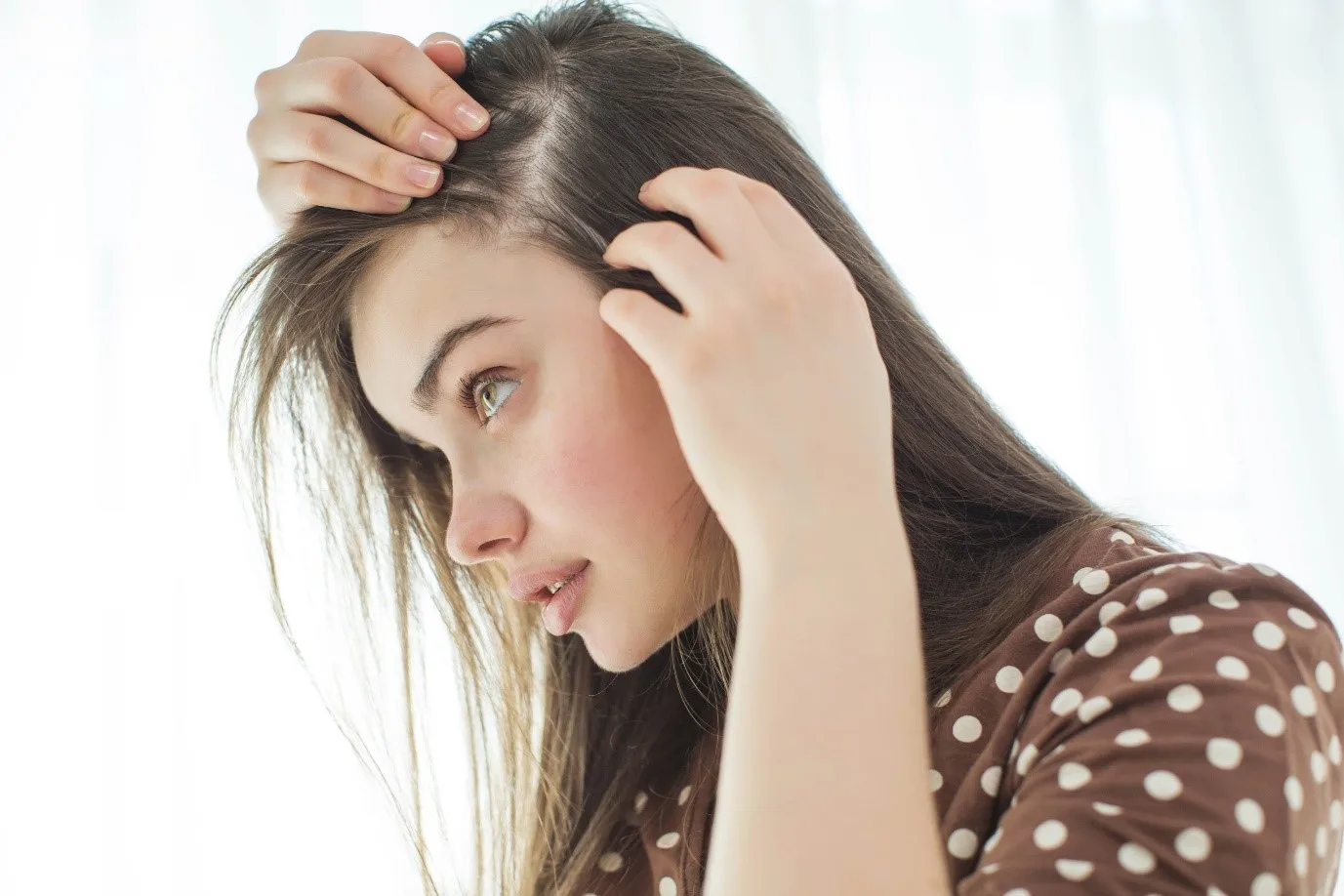DOES DRY SCALP CAUSE HAIR LOSS?

Can your dry scalp cause hair loss? Learn more about the relation between the two.
Nobody likes having a dry scalp, but it can affect us at any random moment. This becomes even more evident when the rains start to recede, and the winter months come up. You can almost feel the dry sensation developing on your scalp . But if that situation turns into dry scalp hair loss, it can become even more troubling.
But does dry scalp cause hair loss?
What are some dry scalp hair loss treatments?
What is dry scalp?
There are numerous sebaceous glands on your scalp, which secrete a waxy substance known as sebum. This sebum is made up of fatty acids, wax esters, and lipids, amongst other things. It creates an acidic layer on your scalp and hair, thereby protecting it from bacteria, germs and microbes.
In certain situations, your scalp might secrete less sebum or is unable to retain adequate sebum. This disruption to your protective microbiome is what leads to a dry scalp , where the skin is unable to retain any moisture. It’s usually accompanied by flaky skin and itching, especially a dry scalp in winter .
The causes for dry scalp are the following:
- Allergic reactions
- Overwashing of hair and scalp
- Sudden change in weather temperature
- Extreme exposure to sunlight and UV rays
- Heat styling equipment
- Hair colour chemicals
- Hormonal fluctuations
- Alcohol-based products
- Poor diet and lifestyle
But does dry scalp cause hair loss?
Your dry scalp condition cannot be the reason for hair loss, but it can make the situation much worse. The human body normally sheds 50-100 hair strands every day, but it turns into a problem when this number suddenly spikes up. And while dry scalp hair loss isn’t common, the underlying reason can cause an increase in hair fall.
When your scalp dries out, there is no longer any protection against bacteria and germs. These can lead to infections and inflammations that might require dry scalp hair loss treatments. Some of the situations where you can see hairfall due to dry scalp:
-
Inflamed follicles-
Infections can lead to folliculitis, wherein your hair follicles are inflamed and are weaker. Folliculitis is often associated with temporary hair loss. -
Reactions-
If you’re allergic to any products, it can lead to inflammation and red bumps on scalp. These can weaken the hold your hair strands have on the scalp and lead to hair fall. -
Scratching-
Dry scalp is often accompanied by itching. When you scratch with your fingernails across the scalp, you dislodge hair strands and cause them to fall out. Scratching can also damage your hair and also lead to scar tissue. -
Weak hair-
When your scalp dries out, usually so does your hair. This makes your hair weaker and more brittle, as the sebum kept the strand layers closed. It’s a common reason for dry scalp hair loss, especially when you have dry scalp during winter.
-
Scalp conditions-
There are certain ailments like Seborrheic Dermatitis and Scalp Psoriasis that can also lead to dry scaly patches. These can cause temporary hair loss on the affected parts.
What are some dry scalp hair loss treatments?
Any hair loss you see due to a dry scalp is generally short-lived. But if you want to break the connection between a flaky scalp and hair loss, start with dry scalp remedies.
-
Oils-
Applying oils on your scalp can dramatically increase the moisture levels. Maybe your grandmother was right and you should oil your head once in a while. Use tea tree oil, coconut oil , jojoba oil, or argan oil, and massage it into your scalp. The act of massaging can also boost blood circulation to the scalp and increase the flow of nutrients, possibly even reducing hair fall during winter. -
Cleanse and condition-
Create a hair care routine that includes adequate use of shampoo and conditioner. These can get rid of any germs on your scalp, while bringing some level of hydration back. Don’t overdo it with the shampoo and use 2-3 times a week. You can also use products that combine shampoos and conditioners into one like the Head and Shoulders 2 in 1 Smooth and Silky . This allows you to simultaneously cleanse your scalp of harmful germs and restore hydration to your dry strands. -
Hair Masks-
If you feel like creating your own homemade hair mask as a flaky scalp treatment, you should use hydrating ingredients that can boost the moisture levels. Aloe vera is effective in this regard, but you can also use products like apple cider vinegar, bananas, yoghurt, avocados, and honey. Be aware of the quantities you’re using and how your body reacts to them. This is not an exact science. -
Change your products-
If you’re having a reaction that is causing some form of inflammation, it might be your products that are to blame. Stop the use of harmful products and try changing them to gentler ones, maybe even a shampoo for winter dry scalp. You can also conduct a patch test on a small part of your skin to see which products are reacting with your body. -
Diet-
This is one of the biggest factors when dealing with hair loss. Change your diet to include more zinc, fatty acids, vitamins A, D, E, iron, biotin, and proteins. We’re usually aware that our diets are weak and unhealthy, but often don’t take that decision to change. -
Stress-
Reduce your stress levels and have a balanced lifestyle. Stress can cause massive fluctuations in your hormones which directly affects the sebum on your scalp and the amount of hair falling down. Find ways to create better moments in your life that reduces stress.
If your hair loss persists for a longer period of time, make sure to visit a dermatologist and understand what they have to say about this.



